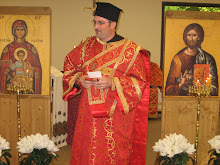
http://thenewliturgicalmovement.blogspot.com/2007/06/view-into-life-of-institute-of-good.html
I thought that this would be an interesting topic for discussion.
The traditional progression for a man discerning Holy Orders was the path through what are called "Minor Orders". Minor Orders are ecclesiastical ministries which are, for the most part, designated to assist the deacon. In the Latin Church, minor orders were as follows:
1. Porter
2. Lector
3. Exorcist
4. Acolyte
The Subdiaconate was regarded as the first stage in Major Orders, followed by Diaconate and Priesthood.
In the Byzantine churches, the Minor Orders are as follows:
1. Reader
2. Acolyte
3. Subdeacon
Certain traditions of the East also maintain the role of Taper-bearer, Doorkeeper, and Exorcist. Those who are appointed to these offices are either ordained (cheirothesia) or tonsured, depending on the rank. The rank of Cantor is also regarded as a Minor Order.
In 1972, with the Apostolic Letter, "MINISTERIA QUAEDAM" Pope Paul VI abolished Minor Orders in the Latin Church, creating instead the "ministries" of Lector and Acolyte.
http://www.ewtn.com/library/PAPALDOC/P6MINORS.HTM
What seems to have been the intent here was to open up the ministries that were traditionally to have been part of the seminary "system" of formation to the average layman in the parish. One does not need to be a member of the Society of St. Pius X to observe that this project has been a total failure. I can count on one finger the number of officially appointed Acolytes outside of seminary or diaconal formation programs that I have met. (Yes, just one.)
The Catholic East maintained the tradition of Minor Orders, but in North America, under a latinizing influence, these became simply a formality in the progression from layman to Major Orders.
Shawn's discussion in the above article is an interesting one. There is some wisdom from the perspective of leadership development in having a stage-gated progression. With each "turn" or "step" in advancement, one has increasing scope of responsibility in the liturgical assembly. The Church in her wisdom established these offices to serve principally under the ministry of the Deacon. This is especially true for the Subdiaconate. Was it really the best timing to abolish these Minor Orders in view of the restoration of the permanent Diaconate in parish life? Why not have simply opened them up to laymen in the parish, with no assumption that just because one has received Minor Orders he is therefore on the "path" to higher ranks in the clergy.
With the restoration of the celebration of the 1962 Missal, is it now time to reconsider the place of Minor Orders in the Latin Church? The whole questionable excess of the phenomenon of the "Extraordinary Minister of the Eucharist" would be a moot point with an army of Subdeacons who have received ordination from the Bishop and dedicated for such service to the assembly. From a vocation standpoint, would there not be great benefit to having men in Minor Orders in a vocational pipeline building a clerical identity with greater responsibility as they advance?
Is it not also an opportunity for Eastern Catholic jurisdictions who are starving for vocations to open up these Minor Orders to men in parishes?
And does any Deacon doubt that his ministry would be greatly enhanced in its effectiveness by having a few men ordained as Subdeacons to assist him?
Just some points for discussion...
In ICXC,
Fr. Deacon Daniel


3 comments:
Yes, the minor orders need to be restored, just on the basis of I'm sick of Extraordinary Mobsters of Holy Communion in the Latin Rite. (I'm a Latin Rite Catholic) and love the Eastern traditions, which reminds me, I'll probably go to their Mass next Sunday.
I think the Latin Church was on the right track that these would be best seen as lay ministries which may or may not lead to an ordained ministry. The problem is they choked at actually blessing people in these ministries and left it informal. Let the Latin Church have blessed ministries of Lector, Acolyte and Subdeacon/Eucharist Minister. Consider allowing the parish priest to invest persons in these ministries, be they men or women.
For Greek Catholics, another opportunity exists. In the early church, most of the faithful who could read and write (a minority of the faithful) where blessed as Reader (Lector). Today, one of the most difficult latinizations to overcome has been the practice of First Communion. These "First Solemn Communion" stunts don't cut it as far as integrity to our tradition, but let's admit the attraction of the rite of passage.
Solution?
With an eye towards our Hebrew roots, let us call every faithful child of the Church (sometime between the ages of 8-17) to the office of Reader. Let their first proclamation of the Word be a great day. Let their parents throw a party and grandparents shwoon. I could develop this in more detail, but I think you get the idea.
What about the restoration of minor orders also in universities? It wouldn't be' a restauration of the pre-conciliar situation but a restauration of the figure of the cleric/clerk, a scholar who underlines particularly his vocation (the research of the Truth) without being a priest and with the possibility of marriage. As in the Middle Age, during the Christian Civilization, the Christendom. The universities clerics/clerks would nave the option of became priests or remain simple Christian scholars. I obviously talk about the Catholic Universities, the descendants of the glorious Medieval ones. We have to make attention, that the universities are NOT the building, nor the scholar. They are Catholic scholars guilds. This would be' a restoration of a tradition, the Latin tradition of the Age of greatest splendor of the Catholic Church. This wouldn't exclude your projects in the parishes. They would coexist.
Post a Comment